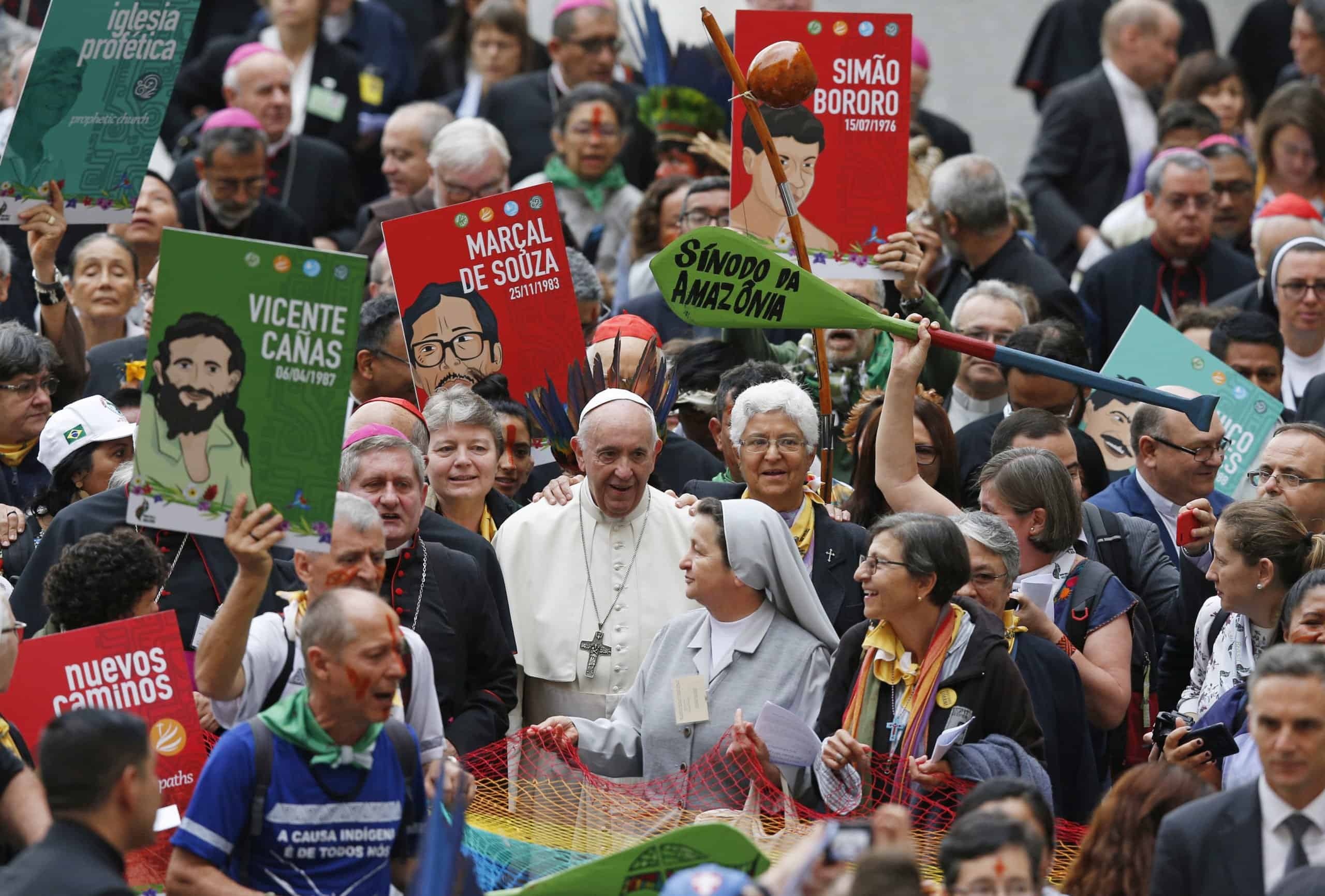The Synod for Bishops of the Pan-Amazonian region caused quite a stir in the life of the Church, at least for those of us tuned into mainstream Western media. Controversy swirled around two proposals (ordained priesthood for married men and a female diaconate) and a statue (Pachamama). But the Holy Father had the final word with his apostolic exhortation, “Querida Amazonia” or “Beloved Amazonia” which sidesteps these controversies, and proposes “a framework for reflection” to “guide us to a harmonious, creative and fruitful reception of the entire synodal process.”(2)
Addressed to the people of God and all persons of good will, “Querida Amazonia” strikes a hopeful, encouraging tone. Its 111 paragraphs also quote liberally from poems about the Amazon, only appropriate for a love letter. The pope aims to inspire in the whole Church a love for the Amazon as a beautiful and rich gift from God to the world but one in need of better stewardship.
The exhortation is structured around four dreams that Pope Francis has for the Amazon region, corresponding to four spheres: social, cultural, ecological, and ecclesial. Below is an overview of the main points in each section. I hope this will inspire you to read and contemplate the Pope’s own words.
Social Dream
I dream of an Amazon region that fights for the rights of the poor, the original peoples and the least of our brothers and sisters, where their voices can be heard and their dignity advanced. (7)
While recognizing that “the Amazon region is facing an ecological disaster”, Pope Francis rejects any environmentalism that ignores the plight of the people in the region, especially the poor and the original peoples. (8) To move past the injustices of colonialism, and those now committed both by international and local businesses with the “excuse of development” (13), the Holy Father calls first for a feeling of outrage and indignation. This righteous anger is meant to motivate us to “build networks of solidarity” and a promote “a globalization without marginalization.” (17)
To overcome the injustices, we need a strong sense of community and a commitment to dialogue. The indigenous peoples and the poor ought to be the ones who take lead in this endeavour. The rest of us are to participate as “guests” and to listen with an interest in learning from them what constitutes “good living” for themselves and their descendants. (26) Once those currently in power humble themselves before the poor and marginalized, we can work together toward fraternity and solidarity.
Cultural Dream
I dream of an Amazon region that can preserve its distinctive cultural riches, where the beauty of our humanity shines forth in so many varied ways. (7)
The Amazon region is incredibly culturally diverse, covering parts of nine nations and including over 110 indigenous peoples in voluntary isolation (IPVI). (29) Pope Francis draws on a favored image, the polyhedron, to illustrate how unity can coexist with diversity. He dreams of intercultural encounter and education that preserve the beauty and uniqueness of indigenous cultures, while allowing for fruitful development.
The greatest challenge to the diverse cultures of the Amazon is consumeristic globalization, which impoverishes the perspective of young people and cuts them off from their roots. (33) Concretely, the economic force that drives young people away from their homes into cities undermines the fundamental social institution of the family. (39) Mass communication and the imposition of foreign measures of quality of life sever the peoples’ natural connection to the environment, which in turn allows for ecological abuse. (40)
Ecological Dream
I dream of an Amazon region that can jealously preserve its overwhelming natural beauty and the superabundant life teeming in its rivers and forests. (7)
As we have already seen, the pope does not believe that we can discuss an ecological crisis apart from humanity. “Everything is connected” and we cannot look at the land as “a resource to be exploited” but we must regard it as a being or beings with which we relate. (41-42)
At this point, the Holy Father launches into poetic hymn in praise of the life-giving waters of the Amazon. The hymn is full of wonder, but it also recognizes the painful cry of the earth when it suffers from violence at the hands of humans. (47)
Pope Francis sees one-off attempts at preservation as futile. Instead, he advocates for protecting the whole ecosystem through an integration of ancestral wisdom with contemporary technology and a legal framework that insures environmental justice. (49-52) The necessary legal and political actions depend upon a change in perspective towards the Amazon. Instead of merely analyzing the situation, we must contemplate the beauty of the region as a mysterious gift from God, as a part of God’s self-revelation. Through this contemplation, love will be awakened that will ensure its proper treatment. (55-57)
Ecclesial Dream
I dream of Christian communities capable of generous commitment, incarnate in the Amazon region, and giving the Church new faces with Amazonian features.
This section discusses the Church’s call to “journey alongside the people of the Amazon region.” (61) The call is primarily to spread the Good News of Jesus Christ, God’s love for every man and woman. (64) The preaching of the Gospel also entails inculturation which affirms all the goodness of Amazonian cultures and integrates the good as enrichment for the whole Church. (68) The Holy Father mentions the ancestral wisdom of the indigenous peoples, which is expressed “in a communitarian approach to existence, the ability to find joy and fulfillment in an austere and simple life, and a responsible care of nature that preserves resources for future generations.” (71)
As a starting point for inculturation, the pope states that a “respectful and understanding love” for the peoples is necessary before one can discern the goodness of various aspects of a culture. Specifically, he affirms that some indigenous symbol can be taken up “without necessarily considering it as idolatry.” “A missionary of souls will try to discover the legitimate needs and concerns that seek an outlet in at times imperfect, partial or mistaken religious expressions, and will attempt to respond to them with an inculturated spirituality.” (79)
Inculturation also applies to the liturgy and forms of ministry in the Church. Liturgically, Pope Francis calls for greater accessibility, especially for the poor, and an increased emphasis on worship as free of cost and a leisurely activity. (83) With regard to ministry, the Holy Father affirms the unique and exclusive role of the priest in celebrating the sacraments of Eucharist and reconciliation. (88) He encourages all bishops to promote priestly vocations and to support those who might become missionaries to the Amazon. (90) But he goes on to emphasize also the importance of the permanent diaconate, religious women and men, and the growth of “a specific ecclesial culture that is distinctively lay.” (94)
Five paragraphs (99-103) are dedicated to the role of women in the Amazonian Church. Pope Francis praises “the strong and generous women” who diligently passed on the faith in those remote regions where priests are rarely present.(99) He also calls out a narrow, functional vision of the Church which diminishes the value of women’s contributions by focusing only on clericalistic status. (100) Instead, the Holy Father calls for more “forms of service and charisms that are proper to women” so that they can have “a real and effective impact on the organization, the most important decisions and the direction of communities.” (102-103)
The ecclesial dream ends by recognizing two challenges: conflict within the Church and interreligious coexistence. Pope Francis calls the faithful to overcome such conflict by elevating their perspective to a higher level, following the example of the early Church which grew from Jewish roots and took on Greco-Roman forms. (104-105). Similarly, in dialogue with other religions, the Church must focus on what unites us, while not abandoning our convictions. (106)
******
The exhortation concludes with a simple plea, before turning to the Blessed Mother, Queen of the Amazon: “After sharing a few of my dreams, I encourage everyone to advance along concrete paths that can allow the reality of the Amazon region to be transformed and set free from the evils that beset it. Let us now lift our gaze to Mary.”


